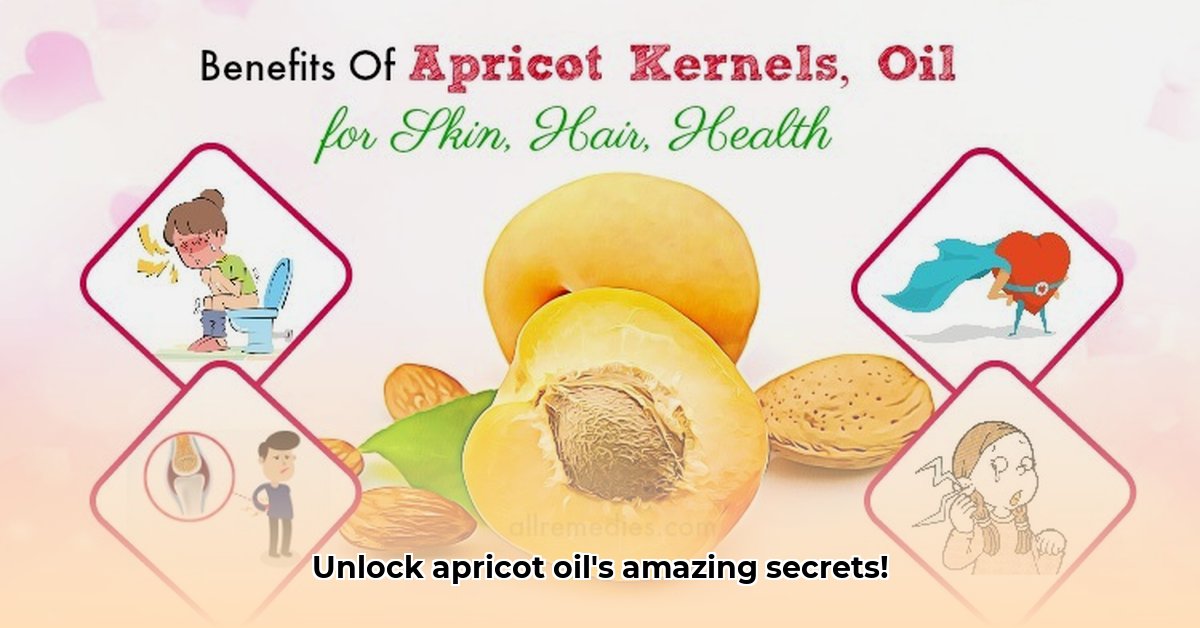
Apricot kernel oil, derived from the seeds of apricots, is gaining popularity for its purported benefits for skin and hair. However, understanding its properties and potential risks is crucial for safe and effective use. This article explores the advantages and cautions surrounding apricot kernel oil, providing a comprehensive guide for informed application.
Apricot Oil: Benefits for Skin and Hair
Apricot kernel oil boasts a rich composition of vitamins A and E, essential fatty acids, and antioxidants. These nutrients contribute to its moisturizing and potentially anti-inflammatory properties, making it a popular choice for skincare and haircare routines. This is supported by numerous online health and beauty resources, including StyleCraze 1.
Skincare Applications
The light texture of apricot kernel oil allows for easy absorption, making it suitable for various skin types, including sensitive skin. It's often lauded for its moisturizing properties, softening and smoothing the skin's appearance. Its purported ability to soothe irritation and inflammation makes it a potential option for conditions like eczema or rosacea, although individual responses may vary. Some claim it helps balance oil production, potentially benefiting acne-prone skin. However, scientific evidence supporting these claims is limited and requires further investigation.
Have you experienced improved skin hydration after using apricot kernel oil? Many users report noticeable improvements in skin softness and radiance, but it's important to remember individual results can differ.
Haircare Benefits
Apricot kernel oil's moisturizing properties extend to haircare, where it can help improve the manageability, shine, and overall health of hair. It's believed that its rich fatty acid content may strengthen hair strands, thus reducing breakage and split ends. Regular application, preferably to damp hair, focusing on the ends, is recommended for optimal results. However, the effectiveness varies depending on hair type and individual factors.
Does apricot kernel oil truly strengthen hair? While many users report positive experiences, further research is needed to definitively establish its impact on hair strength and reduction of breakage.
Apricot Oil: Culinary and Cosmetic Grades
The distinction between culinary-grade and cosmetic-grade apricot kernel oil is critical. Culinary-grade oil undergoes additional processing to reduce amygdalin levels, a compound that releases cyanide upon ingestion. Cosmetic-grade oil is specifically formulated for topical application and typically lacks potentially harmful additives.
Always select a reputable brand, clearly labeled as either "culinary grade" or "cosmetic grade," to ensure its intended use and safety. Opting for cold-pressed, organic options is often preferable to maximize the concentration of beneficial compounds.
Safe and Effective Apricot Oil Usage
To harness the potential benefits of apricot kernel oil while mitigating risks, follow these steps:
Patch Test: Before any widespread use, conduct a patch test on a small, inconspicuous area of skin. Observe for any irritation or allergic reactions within 24-48 hours.
Topical Application (Skin): For skincare, apply a few drops of cosmetic-grade apricot oil to cleansed skin, gently massaging it in. Less is often more; start with a small amount and increase gradually if needed.
Topical Application (Hair): For hair, apply a small amount of cosmetic-grade oil to damp hair, primarily focusing on the ends. Leave it on for at least 30 minutes, or even overnight as a deep conditioner, then rinse thoroughly.
Culinary Use (Proceed with Extreme Caution!): Use culinary-grade apricot kernel oil sparingly in cooking, only as a flavor enhancer. Never consume it in large quantities or directly. Even then, exercise caution, as individual sensitivities vary.
Potential Risks and Precautions
While generally considered safe for topical application, apricot kernel oil carries potential risks:
- Allergic Reactions: Though uncommon, allergic reactions are possible. The patch test is essential to prevent adverse reactions.
- Cyanide Poisoning (Internal Consumption): Ingesting large quantities of apricot kernel oil, particularly unprocessed kernels, poses a serious health risk due to amygdalin content. This is why strict adherence to the culinary guidelines is vital.
Disclaimer: This information is for educational purposes only and does not constitute medical advice. Consult with a healthcare professional before using apricot kernel oil, especially if you have existing health conditions.